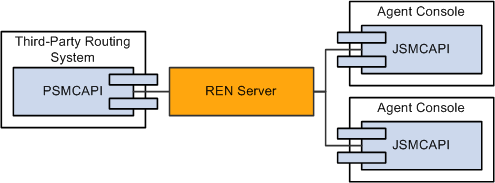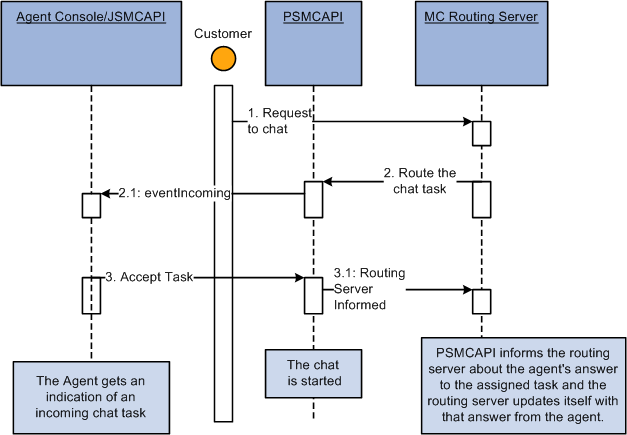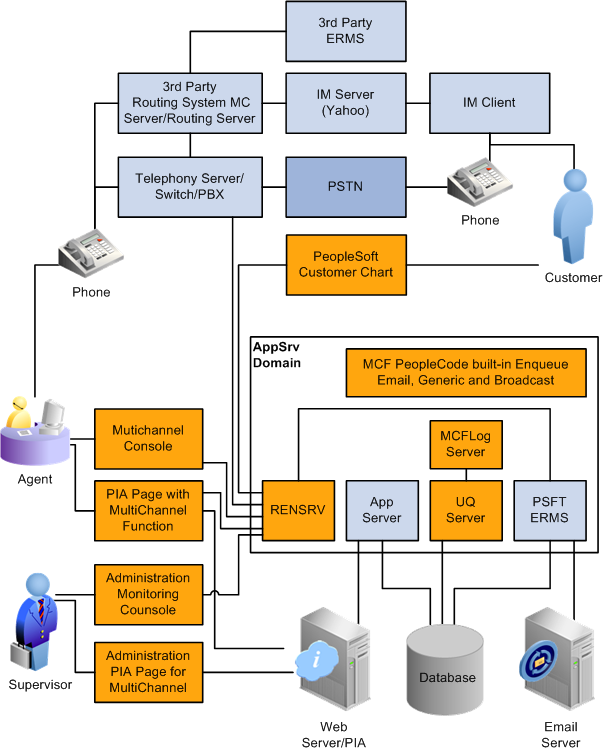Understanding Third-Party Routing Systems
In previous releases, PeopleSoft CTI required a third-party middleware in the form of the Genesys CTI Framework, a Cisco ICM system, or CTI middleware that implements PSMCAPI.
Beginning with PeopleTools 8.48, PeopleSoft MultiChannel Framework (MCF) uses third-party multichannel routing systems to offer a wide range of communication channels to empower PeopleSoft applications like CRM. In the third-party system, the queue is the logical storage unit for representing a work item, and no difference exists between a logical and physical queue. The third party develops the universal routing system to route email, voice, chat, and generic tasks.
PeopleSoft customers may choose either the pre-8.48 features of queue server and CTI or the new third-party routing system to use email, chat, voice, and generic channels.
PSMCAPI provides an interface to the third-party routing system that enables communication between various PeopleSoft components and the third party. An event, like an incoming task from the third-party routing system, is received by PSMCAPI and pushed to JSMCAPI (MCF console) using the REN server. Similarly, a request from MCF console or JSMCAPI is sent to PSMCAPI using the REN server and is eventually passed on to the third-party routing system. The REN server routes requests and events internally to the PeopleSoft system, including an agent desktop or browser.
Image: PSMCAPI interface with PeopleSoft MCF
The following diagram illustrates how PSMCAPI acts as an interface to the third-party routing system and communicates with JSMCAPI through the REN server.

Image: Interaction of PSMCAPI with third-party and JSMCAPI
The following diagram illustrates the interaction of PSMCAPI with third party and JSMCAPI.

PSMCAPI and JSMCAPI support multiple channels of communication, queue, and agent statistics information that enable the leverage of third-party routing systems.
Image: Third-party routing system with PeopleSoft MCF
The following diagram illustrates how the third-party routing system interacts with PeopleSoft MCF.

The third-party routing system connects to all kinds of media servers, and routes the task to the agent based on routing rules. The third-party routing system connects to the REN server through HTTP or HTTPS using PSMCAPI. All requests sent by the agents to third-party system such as login, logout, accept incoming call, and forward email use the above connection. All media requests sent by PeopleCode built-in functions to the REN server such as InitChat or Enqueue also use the above connection. All events from the routing system such as assignment, broadcast, and statistics, go to the agent or the supervisor through this connection.
In the third-party routing system, the queue server acts as an overflow or escalation adapter that writes the overflow or escalated tasks from the third-party routing system to the PeopleSoft Database. When using a third-party routing system for escalated and overflowed task, the queue server is used for task insertions to the database. The third-party routing system processes and maintains task properties and timers. On a task time-out, the routing system sends an event to the queue server to insert the task in the database. The routing system creates the events to remove the task from the agents and recalculates their workload.
In general, the third-party router:
Allows business users to define routing strategies.
Defines escalation and timeout routing paths.
Allows agents to receive any type of work from multiple channels and queues simultaneously or in parallel.
Allows pushed and pulled events simultaneously or in parallel.
Defines intra- and extra-channel escalations.
Third-party routing rules are based on:
Task type, for example, email, chat, voice, scheduled callback, fax, and so on.
Time against SLA (Service Level Agreement) in form of overflow and escalation timers.
Priority of the event expressed as a positive single-digit number.
Skill within organization or task type.
Primary language required to resolve any issue.
Cost of each event type assigned by the administrator to avoid overloading.
The agents or supervisors must have the capabilities to:
Change the skills, language, priority, or cost of an item to affect its subsequent routing.
Assign an item to a specific queue or agent.
Accept, reject, forward, mark as resolved, or mark as awaiting additional information.